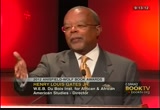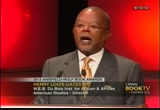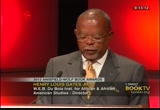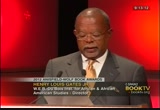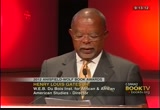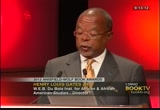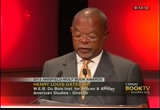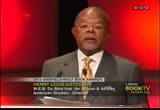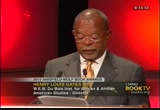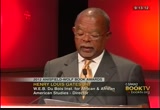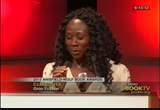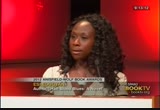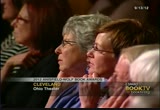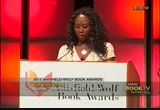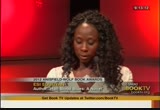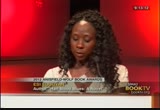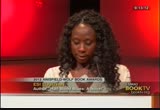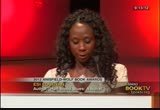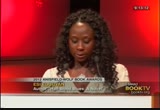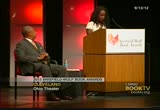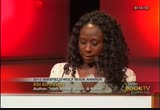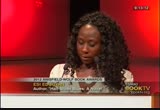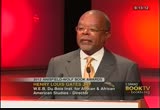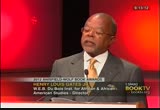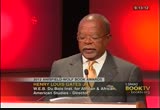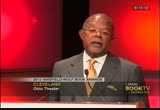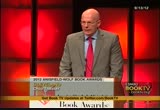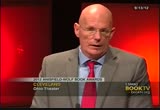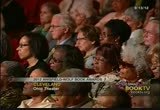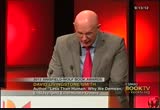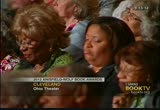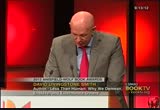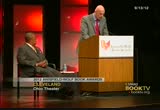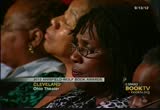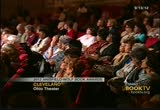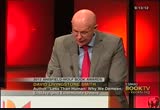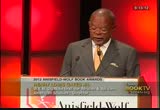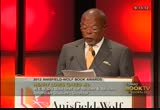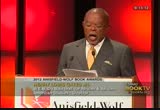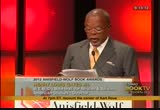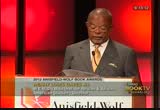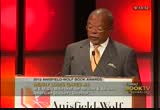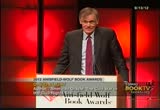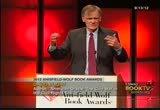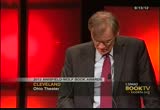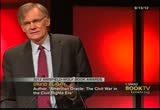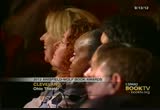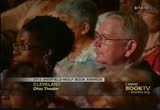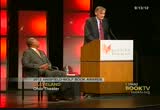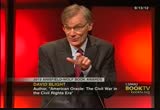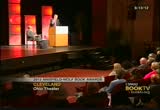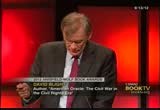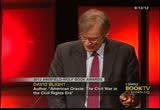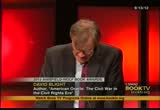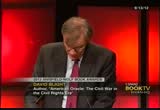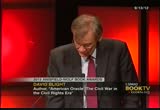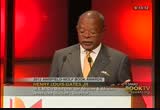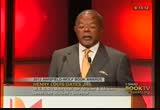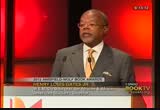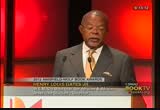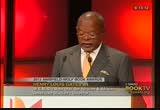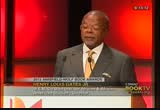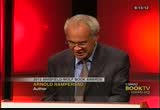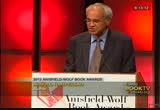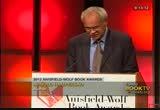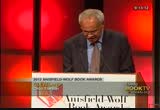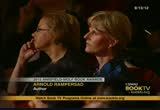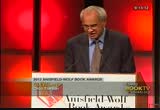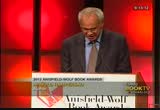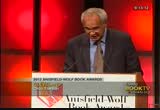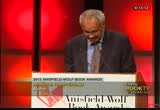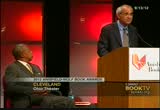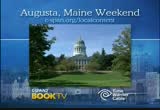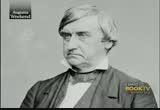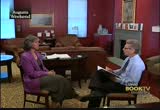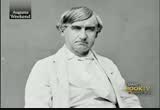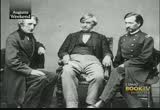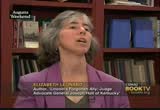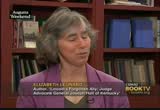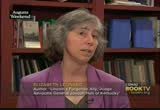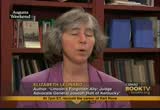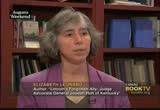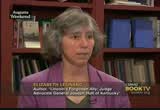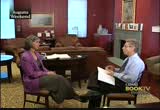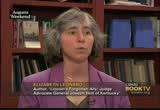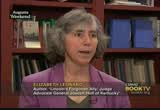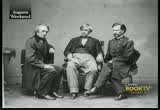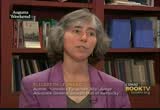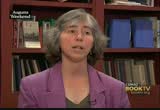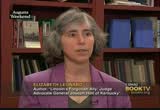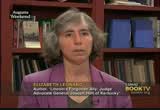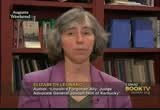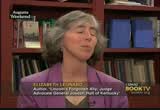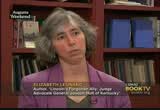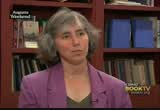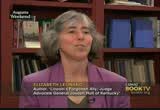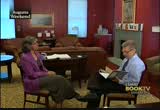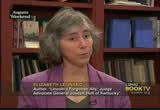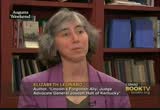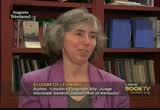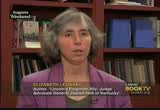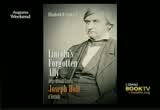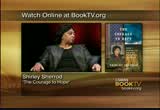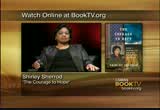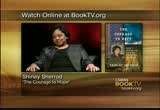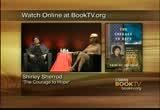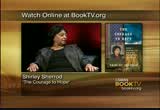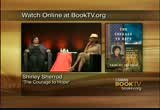tv Book TV CSPAN October 7, 2012 4:00pm-6:00pm EDT
4:00 pm
4:01 pm
[applause] banks borrow that you do for cleveland and all that you've done to ensure that he did in a steel's commitment, a visionary commitment incredibly made three quarters of a century ago to honoring such an odd day, excellence in the literary and scholarly explorations of cultural diversity. you have ensured that this vision, this crazy idea is not only been protect good, it has been nurtured. it has been expanded. it's been fulfilled in ways that edith anisfield scarcely could've imagined. let's give it up for bob richards. [applause] these arches in nature by stellar jury, composed of the poet rita dove, joyce carol
4:02 pm
oates, psychologist steven pinker, my colleague. a historian, simon schama. this has always been a major national book prize with a host of us any previous winners, including among so many others, links to use, zora neale hurston, and the reverend or the king junior. and now, thanks to the vision, committed in sheer energy of one person, we now have a hot website and live streaming video of our event, national press club in several supporting lectures and presentations. you all know that one person is the lifeblood of the anisfield-wolf book awards, my dear friend and comrade, mary louise hunt. give it up for mary louise. stand up, mary louise. [applause] our annual ceremony has become an event in cleveland social
4:03 pm
intellectual calendar and that takes an entire team of people to pull off, including ron of course, but also sandy shoals. cindy, please stand up in the six other team members who have worked for months to create this evening. give it up to cindy. [applause] as mary louise put it to me just yesterday, and i quote an e-mail, making sure it's going to be here, she e-mailed me three times and called me when i was on the plane. i mean, it was terrible. i was coming. i start to get my shoes shined in each of us had. i'm quoting from her e-mail to show her that i do read them, even if i do ignore them. edith anisfield-wolf she wrote was a quiet and reserved person would be astonished and thrilled with how many people across the country now understand her resolve to open mind. to open minds to the rich diversity of human cultures in the tragedy of waste of
4:04 pm
prejudice. it's about to serve as chair of the jury into play even a modest rule and fulfilling edith's belief in the miracle of the cultural diversity of the human community, a diversity these awards for perimeter shooter returned he appeared to thank you for honoring me with this assignment. and now, let's get onto the reason the chief come here, to meet this year's honorees. it is showtime, ladies and gentlemen. esi edugyan. this is the miracle of phonetic spelling, ladies and gentlemen. if you saw this text, you wouldn't even recognize the child's name. whipping from baltimore to berlin to paris, how blood lose its esi edugyan story of a huron
4:05 pm
miss full, not for german trumpet player in his band called the hot 10 singers. as they lay berlin in 1939 or occupied paris, were arrested by the for the crime of being out for german jazz musician. degenerate, both by birth because he's one of the so-called produced by the unions of german women and french colonial soldiers after world war i and degenerate by choice because the nazis, the hot tap frivolity. and about that as an insult. the central figure of this novel has been praised to the evidence and which uses the little -- i'm sorry, which uses little explored corner of the african diaspora to address the needs of
4:06 pm
creativity, community, and the trail and preservation of itself, relation to the other in the very nature of both historical memory and historical discourse. the novelist powered not only by its flight from place to place an person-to-person, but, but also everything most impressively by the brilliant use of black vernacular. vernacular language from a common language spoken by people has powered african-american fiction for more than a century. the gist of charles chestnut convention to run lengths in his comments are no prson, ohio sony myers. the language their characters speak becomes almost the characters so. vernacular is an expression of reclamation, belonging of identity and most certainly a place. it's also an assertion of authority over particular story. it establishes the storyteller, if you think about it, as the
4:07 pm
master of the story, as the definer of her or his own terms. the story is about a hero ostensibly, but narrated by the backseat griffey's who has his own bones to pick in his own story to tell. esi edugyan's language of the book is a hybriddomain micheline to use the derogatory german term for halfbreed, quote, unquote. enlisted himself call small rolltop. she draws the well recorded patch for at the time. women are genes in mailmerge solutions for. i rather like that itself. because they swing placates. but it is his retelling, nazis at the booths. called the funding of history's language in around one of the genuine pleasures of writing this book.
4:08 pm
indeed, to some of the features of the critics have most resounded race as well. food facts of "the wall street journal" hailed it ventriloquism. the critic in the independent, in the u.k. wrote, and i quote from the novel is truly extraordinary in its shimmering just vernacular. his pitch perfect male banter in. fine. he continues to never stumbles for storytelling, not even over one sentence. and sometimes literally have to compressive comparisons of writing to jazz pier one a critic raises one has about half "half-blood blues," that it's blue woodley flutist has. i agree, but i worry that regulation is too easy, two traits. however in the case of this novel, it happens to be what not. for the killer a word well, it
4:09 pm
is conventional to liken the pros and novels about jazz music is a-alpha so there could could be no higher praise. in this case, they continue come to say rather that any jazz musician would be happy to play the weighted teaching rights. her style is perceptively conversational and easy, but with the simultaneous exuberance and discipline of a true prodigy. but this book makes you louise armstrong's west end blues, these two works of art alone together, unquote. in the words of a guardian u.k. review, esi edugyan really can write, which access has won numerous awards, according to the most proficient english, "half-blood blues" one the 2012 at the wilson fix and price and was shortlisted for both 2011 man booker prize in the 2012 orange prize for fiction.
4:10 pm
among many others. it was selected by "the new york times" book review as an editors choice is the best book i've been here ever comparable honors by amazon, quote choir, the "san francisco chronicle" to name just a few. "half-blood blues" a edugyan is first second novel. and one of 2004's books to remember but the public library. nominated for the personal advocacy award award and part of the not fiction program. as a fan beloved nigeria. in calgary, making her in home now and the doria, edugyan in the with residents in spain, iceland and germany. she is a writer who says promises to leave but literature and the holder's direction.
4:11 pm
and i happen to agree with that. for each location, for her either occasion of the time and place that are entrenched in our imaginations, through the language that they use, even as they defy our imagination and for her elimination of people, upon whom to little historical or literary lake has been shown. esi edugyan is awarded the anisfield-wolf award for fiction for her startling and startling novel, "half-blood blues." [applause] these back ♪
4:12 pm
>> and so, so honored to be receiving this award tonight, to be associated with this long distinct system an amazing writers who have won this before. it's incredible. o-oscar to be associated with everything this award races and stands for. you now, i'm terribly honored. so i'll be reading from "half-blood blues" tonight and i will start at the beginning, not to give anything away. and dr. gates did a beautiful job of introducing, you know, the themes of the novel. so just dart right in. in paris 1940, chip told us not to go out. says don't you boys tend the downfall. but involved in one night, all the story of rights. wrap is cheap, you see.
4:13 pm
it stayed like nails, didn't even look right, almost ian black in the bottle, lectern can slop water. you see, when i exhausted the flat, sunrise seeps through the cops, drops the clock on her skin. a couple hours before, we were explaining, trying to cut a record. more like a closeted coast and any music. the crack teterboro being steamed, empty bottles rolling all over the warped floor. our cigarettes glowed like small holes in the dark and that's how i know he was advising. not moving or not they. the scene just sitting there in his mouth like he could hear his way through. everyone pacing about, listening takes to describe rat. priceless says hal. it could be he wasn't so rotten,
4:14 pm
but i at least felt off. too nervous, too crazed, too busy watching the door. forget the studio seclusion. take after take to the end of that, only to have here is crashed the dampness, tossing it in the trash. just mistakes he kept muttering. with some like royalty after they got done with them. coleman and i said nothing. our head thing entirely. bagheera wiping with it blackstrap handkerchiefs. even not our worst, were genius. the data burst on me? for weeks he'd been going on and on about how tripoli sound.
4:15 pm
he kept snatching up the discs come the scratching of the pocket knife, rocky mount, killing how there was nothing in none. but there was something. some see as twisted beauty. i didn't mean to, but somehow when the kid turned his back, i was fighting off my best, taken the last disc of a still delicate come and folding the fabric around it. i glanced around, nervous, detected intimate base case. the others were packing up their axis. reason i lost record that said hero? he appeared at the trashbin come at the damage discs in the. he didn't want it, did you? he gave me a sour look. ain't no point. we ain't never going to get this right. what are you saying, kid? are you saying we should give it up? packages shura.
4:16 pm
we lined up the empty bottles along the wall,. perky was on in paris was a grand, all chordate shadows and stale air. i made in a quiet way along the alleys to madrid in the footsteps and so in up again at the flats. we collapsed into dirty couches. i set backs against the wall and i could feel the disc just sitting in there, still warm. i felt his presence so intensely as hamstring. it's like holding all that he peered a couple months before, these spreadsheets across the windows, but if he the sun didn't come during the way. the errors felt to steal to sober up in. we need is to get enough
4:17 pm
pressure. a bright note recent weeks. he was stripped in his chair, his legs that went all of a sudden he turned to me, his face in dark and smoother than it planned. my guess or pure gravy, man. man, i've got to get me some milk. amen i said again. we talked like mongrels. half german, half bar slang. a few scraps of french between us. the only real in which i spoke aside from english, but once i started messing up the words they couldn't drink nothing out again. fine, kid hailed from the rutland. he talked like he did. he was still young that way, mimicking. someone had changed.
4:18 pm
he apparently had nothing since the boost offended on the city in late fever is fashion when it comes to come and there is a new darkness in him i never seen before. i gave my all to ask a quick lance, thinking of the record text away in there. it was a guilty cells. well, not exactly. he was sort of half rolled onto the road. all said, he groaned, and personnel? in the cupboard i reckon. pierrot coughed. i'm trying to clean my stomach, not profit. his left eye twitched high up on the lid, do we sometimes see the heart of a thin woman beating through her blouse. it's milk i need, brother. cream. that powder stuff over at right through you, like you in our class. it ain't that bad i said. it's not open at this hour anyway, kid. you know that.
4:19 pm
except maybe the crew. but that's too far. in silence a minute. and the bat that i could just make out the last few chairs. like a flock of geese hiding because there was the last of it that's than a grand old flat to go by stories. i'll be with the 14 shares, chandeliers, tapestries, and stickiness hyatt at the train station. but he don't urge her to sell what she could be for the cause, and. now the flat been so empty, you felt only at steps, like you're stranded at sea. the whole place nothing but darkness. i glanced over at hero, now knotted up in his chair. hey, kid, i put a hand to my
4:20 pm
head. you are serious about giving up on the record. you know that. he didn't seem to have hurt me. i watched it and he himself up a sea like an old mule. then he started staggered on over to the door. at least i reckon that was his idea. and that's more like he's heading for the fireplace, stumbling all about, his shoulders on the wall. what are you doing i said? hero, what are you doing kid? what do you mean what am i doing? you never seen a man put on the shoes before. i'm going to put my team code on next. here was wrestling is sold houndstooth code. edit all twisted and his sleeves. anything daylight right about now. i stayed up till of 19 cents.
4:21 pm
this ain't no kind of our kid. you let yourself. you're been a fool. you know you don't cut any papers. what are you going to do? he shrugged. getting afar. he ain't open the door to split out onto the landing, slain in the half dark, staring ichat is very felt uneasy. don't know why. well, just a few blocks away and it was a fire. all right, all right, hold up, i'm coming. i stumbled up from the other shoe. another receptor known as white marble stairs in the dark and pushing him into the street. we usually went out of nowhere in the daytime. never without delilah, never the same thing twice and not ever into who they shall say, but
4:22 pm
hero, he grown reckless stilley occupation deepened. he was a half breed, dark minoso ever like to get his mama. hell, his skin was like pure oil, ended his face was of the fatherland, just about everything about what their right. after this the fact he didn't have no identity papers right now, well, let's just say it was no cakewalk for him. me, i was american and so light-skinned people took me for why. i come off straight haired, green eyed boy white little spaniard. i'd be lying if i said anything back in berlin. when it gone out together together in that city, anyone approaching us always come
4:23 pm
straight to me. when he cut in with his native german, while, but gently dear mayor dyer surprised. most like to go. the savage tacky like a civilized. you see that old clinton arrived, like a knife turning. we fly to paris, but we know vilest sign of the chaos forever. it all meant out when his state. sometimes, when i looked up for the curtains, starting onto the emptiness, i was the old berlin. i would say that i am although class on our streets scattered. with a messing it up and when we drafted over to the curtains, it's like cooking mom on a carnival. crowds in the firelight, broken bottles. we come down after a minute. it was like walking on a gravel
4:24 pm
path. all of them shares clinching with each step. the synagogue of the block was on fire. we watched firemen standing with their backs to the playing, i'm on all the other buildings to keep the fire from spreading. a fire light was shining on the wet street. the hose water running into the drain. here and there, i seen teeth growing like opals on the black cobblestone. thank you very much. [applause] >> beautiful, thank you.
4:25 pm
david livingstone smith. david livingstone smith has long been a student of some of humankind spacer impulses. this 2004 book, why we like him in the evolutionary roots of dissension in the conscious mind is training the velocity of mind, psychology and psychoanalysis to examine the inevitability of deception. we are wired for it. in 2007, he explored the bellicose tendencies of human and the most dangerous animal, human nature and the origins of war. it seems we are wired for that, too. "less than human: why we demean, enslave, and exterminate others" one of our two nonfiction winners tonight brings history psychology, biology, anthropology to bear on the phenomenon of dehumanization. the practice of one group, the practice by one group of
4:26 pm
rendering another group subhuman. needless to say, even if dehumanization takes on particular cultural forms, it is nonetheless as ancient as humanity in his argument. and it's what he calls the joint creation of biology, culture and the architecture of the human mind. it is not difficult to think far too many examples from the 20th century alone, awards that have been used to dehumanize and indeed to kill. berman, cockroaches and dogs. have we been told by the aggressors, populated the human landscape says germany, rwanda, the sudan and the middle east, to name just a few of the most glaring examples. in reading smith's analysis of this language in thinking about the human tendency to treat groups of people, not as people, but as animals. one wonders if there is any
4:27 pm
other species that needs to make its enemies not only class i or comet that would seem to be the law of the jungle is aware, are categorically different as well. we can certainly see this radical dehumanization inerrant history. black slaves are not only that they are, but were fundamentally different than their white slave owners. never remaining wholly in the realm of either philosophy or psychology, but i was training samples from her experience in the world, smith argues that they want to overcome our tendons used to dehumanize, which lead to atrocities and genocide, we must look these tendencies square in the face. we must study down honestly, openly, in order to control them. "less than human" has garnered lavish praise from scholars. in the evolutionary psychology,
4:28 pm
looks like smith should be required reading for all with a social conscience. his ideas that define their way into every school curriculum. the psychologist paul bloom calls it a beautiful book on an ugly topic. charles w. mills, dean of moral philosophy calls it, and i quote, a powerful and original work that forces us to recognize the monstrous atrocities are routinely carried out, not by monsters, and but alas by ourselves. reviewers in the mainstream press, including barbara ehrenreich in "the l.a. times" book review have admired the book for its thoroughness and precision, even while contesting some of smith's argument. this is why in the opinion of the jury, this is, i'm sorry, in the opinion of the jury a sign
4:29 pm
of a well read book because it indicates in this case that nothing human participates in and inspires a dialogue about what it means to be human and inhuman and challenges readers to contemplate the very large questions of speed and human connection. professor smith is written for u.s. times, "usa today" and other national publications and has been a frequent guest on npr, bbc and broadcast television. he recently addressed to g 20s, bbc and broadcast television. he recently addressed to g 20s and he is cofounder of the new england institute for cognitive science, and he is cofounder of the new england institute for cognitive science, an evolutionary study. religious studies at the university of very good. he's been an unflagging student of how human beings make their way in the world, even though that way is often not pretty. he challenges each reader to tinker with their own wiring, to be aware, and he hopes to do
4:30 pm
better. for his profound insights into the human condition and into the conditions, some humans play some others, we present him the anisfield-wolf book award for nonfiction. [applause] ♪ the night this is wonderful and i deeply appreciate the fact that such a distinguished jury read my book, much less thought it worthy of this great honor. in a moment i am going to read you an excerpt from "less than human," which deals the course of the atrocities of the past.
4:31 pm
but i think it is useful to remind ourselves that the plaintiff considering atrocities that the path is to make a better future. if we can understand what has driven us to do the terrible thing we've done to our fellow human beings, perhaps we can fashion the future with no more rwanda is, nomar alice which, no more acute or shema. so to strike a somber note, i would like to remind you sitting here in join this event, that halfway around the world there is a genocide of attrition going on in sudan and that genocide is being fueled by the immunization i will not go into it more, but those who are interested can speak to my dear colleague, alcide, the founder of the
4:32 pm
africa coalition. and i will have literature on the table in the reception after the ceremony. so, let me read. the dehumanization of african-americans did not end with the creation of the new nation in 1776. over the evolution of slavery in 1865. books and pamphlets published during the latter part of the 19th and early 20th centuries continued to assert that they were use. during the 19th century covenanter discipline of anthropology gave the racist ideology but then your scientific respectability. some like a bird or searches or william lawrence, the harvard geologist and the philadelphia physician, samuel george morton were polly jenne says, people who believe that each race evolved independently of the others and therefore the black people were the separate
4:33 pm
species. quote, the is more like a monkey than european reports cannot be denied as a general observation, end of quote. the german anthropologist, theodore bates vividly described, points of the polly genesis mindset, with extermination this policy. writing in 1863, of those who regarded the so-called lower races i subhuman creatures, he remarked, if there be various species of mankind, there must be a natural aristocracy among them, a domino by species as opposed to the lower races, who by their origin are destined to serve the nobility of man kind and may be tamed, trained and used like domestic animals were made, according to circumstances, be fattened her use force physiological uses without compunction. to the to a higher morality with
4:34 pm
the as foolish to expect the lime trees would die cultivation bear peaches with a monkey learned to speak retraining. all wars of extermination, whenever the lower species are in the way of the white man, are they not only excusable, but fully justifiable since the physical existence only is destroyed, which without any capacity for a higher moral develop and come in may be doomed to extinction in order to afford space to higher organisms. and he went on to add, this time with delicious irony, that such a theory has many advantages. it flatters her self-esteem by the specific excellence of our moral and intellectual endowment and saves us the trouble of acquiring for the causes of the differences existing in civilization. this theory has obtained many
4:35 pm
appearance. most, there were some who consider this one of the reasons, which rendered the assumption of a specifically higher mental endowment of the white race improbable. paula genesis, sometimes dubbed the american school because of its popularity in the united states, especially among slavery. many americans use the bible with biology to underwrite their racial beliefs and even more outlandish manner than the 17th and 18th century predecessors had done. some malicious biogenesis believes that africans are not of lineage, but were descended from animals that he took ark. others believe that? are the progeny of the devil are descendents of a subhuman race got had fashioned prior to his creation to add on. a book entitled, the negro from
4:36 pm
a piece, published at the turn of the 20 century by the american book of bible house -- biological fantasy. [inaudible] obviously using the word man rather loosely. would evolve from an ape cavorts adamantine for white people created in god's own image. beliefs like these sealed the continued violence routinely directed at african-americans during the centura so following the civil war. the story of all to bang out, bosch was tribesman provides a heartbreaking illustration of the dehumanization of africans during this period. mulder then go to this wife and children a vast tract of land central africa, then called the congo free state. king leopold the second of the second intelligence found as the congo free state ostensibly to
4:37 pm
provide aid to the people living there. however, the congo free street was anything but free peer leopold ruthlessly exploited its land and people, treating of resources like rubber, copper and ivory and exterminating approximately 8 million people in the process. a core of african mercenaries and forest the reign of terror. they did their job but gratuitous cruelty. men, women and children who fail to meet quotas are flawed with hippopotamus webster had their hands hacked off with a machete. the hands are then collected and baskets and presented to colonial officials. one eyewitness reported in foolish which refuse to provide proper would be completely swept clean. i saw soldier molly liebman guarding the village of bully to take a big mac, but 10 arrested natives in it, attach big stones
4:38 pm
to the net and make it tumble into the river. soldiers made the young man or kill their own mothers sisters. off the village was one of those swept clean who murdered his wife and children sold into an african slave trader. it was at this point the samuel phillips entered the picture. werner, commissioner and march were nervous on a mission, but not a religious one. he recently signed a contract to bring exotic specimens of humanity to st. louis for a human zoo at the 1904 world's fair. this was to be a great ethnographic exhibit, giving visitors an opportunity to although with tribal people brought to missouri from the four corners of the world. even the old apache warrior, better known by his mexican surname, nickname, geronimo, was going to be on display. werner was shopping for pygmies when he discovered he paid off the slave merchant and took the
4:39 pm
young man to the united states along with seven other botswana who agree to join them. when the fair was over, werner returned them all to their homeland and remained in africa for a year and a half collecting artifacts and animal specimens. during this time they became friends. i got accompanied werner on his collect in adventures and eventually returned within two united states. after a brief stint at new york's museum of national history, to banka was given a home where he soon became an exhibit, sharon a cage with an orangutan. she expressed objection to this site as a human being in a cage with monkeys is japan as "the new york times" wrote the next day and there could be no doubt that the majority, the joint man and monkey exhibition was the most interesting site. spokesmen for the
4:40 pm
african-american community protested reverend james h. gordon pleaded, our race we think is to press enough without accepting one of us at the eight. we think we're pretty have been considered human beings with souls and the delegation led by the reverend rs macarthur addressed the matter and a letter to the mayor of new york. the person responsible for this exhibition degrades himself as much as he does the africa. instead of making abyss of this fellow, he should be put in school for the development of such powers as god gave to them. we send missionaries to africa to christianize the people in the neighboring went here to brutalize him. he's protested not focus entirely on the racially degrading character of the exhibit. they were also concerned the exhibit supported darwinism, which the is anathema to many christians. buckwheat under the pressure of controversy comes to authorities released from his cage and
4:41 pm
allowed him to wander freely around the zoo, wagering crowds pursued him. the times reported, there were 40,000 visitors to the park on sunday. nearly every man, woman and child made for the monkey has see the star attraction in the park. the wild man from africa. they chased him about the grounds all day, howling to major in and yelling, some of them poked him in the ribs, other strip to not, all laughed at him. what happened next is not entirely clear. one sultry summer day, decided to undress. apparently keepers try to force them back to his close and respond by threat of them with a knife. he was probably transferred to the howard ocean assailant. he declined the offer to return him to africa because despite his bad experiences in new york, they were nowhere near as bad as the horrors unfolding in his homeland.
4:42 pm
after a scandal involving a teenage girl, he was transferred to long island and eventually to lynchburg, virginia, where he attended lynchburg seminary and was employed in a tobacco fact three. 10 years after arriving in the united states, longing to return to his homeland, but unable to afford a steamship ticket back, ought to banka put a bullet through his heart. thank you. [applause] >> thank you. david blight process centennial. we are all familiar and if not we soon will be. the 150th anniversary, sethi quintanilla of the emancipation proclamation is upon us in 2013.
4:43 pm
many books are publishing conferences planned to commemorate this remarkable event in human history. we're inside testing such an event at harvard next may. the signing and implementation of the emancipation proclamation was a remarkable event by any measure, but not an uncomplicated one. president lincoln's thoughts on slavery, freedom and african-americans evolved over time and were propelled by sometimes philosophical, sometimes pragmatic hercules of the needs of the nation. no scholar has taught us more, or taught me more, about the role of memory and historiography of the civil war and the national narrative that emerge from it then as david w. plate. his 2001 masterpiece called race and reunion one of the most words of the field at the
4:44 pm
bancroft prize and abraham lincoln price, for douglas prized at 40 words from the organization of american historians. in this book he argued would seem so. to us now, largely because of his work, but the chief narrative follows the civil war were about the north of the south and how they people thought. but as the historian joan law points out, left out of this account were competing narratives. and i'm quoting, one of those narratives is the story of slavery emancipation and freedom, unquote. blights mandate has long been too pathetic narrative back into the official account of the civil war. and his other works in supper, including beyond the battlefield in a civil word, passages to freedom, underground railroad and they slave no more, two men who escaped to freedom, including their narratives of
4:45 pm
emancipation. and countless articles, essays and lectures, returned to different aspects of the theme of memory and commemoration and what it means to complete the subjective accounts with fact and history and not to recognize them as the active at all. now he comes to us with an american oracle, the civil war and the civil rights era, which brings this nuanced exploration into the 20th century. as we approach the sesquicentennial of the proclamation, wait brings to light how american writers brought their own perspectives to bear on the centennial of the war. how they grapple with the issues it raised unhealthy influence public number and commemoration of the word to varying degrees. the four writers from the southern novelist and essayist, robert penn warren to recant his view of the civil war is a lost
4:46 pm
cause midwestern historian bruce cotton causes her to norman rockwell come in part because his capacious works on the civil war were widely read at the middle of the century. northern utes in literary critic, edmund wilson looked at the war in terms of its own pacifism, often neglect in the role of race in it in the northern negro novelist james baldwin who is the most acute essayist and tinker in the american psyche hands down working at that time. blight said that all four, and i quote, are geared to say with america's tendency towards a progressive tribal sunny sense of history at all for comdisco continues, demanded americans try to see through their well practiced in comfortable myths about the civil war and develop a genuine and authentically
4:47 pm
tragic sense of history. theo colley, critic and novelist, carol phillips said of the book, and i quote, it effortlessly seems together. whatever reanalysis biography of historical thinking and in a thoughtful and appreciative review in the new york review of books, intertel banko calls it suggestive pier one of our most noted and audit historian, david blight class of 1954, professor of american history and director of the center of slavery, resistance and abolition at yale. he has held fellowships at the huntington library macomb center for writers and scholars and is an elected member of the american academy of arts and science. blake has continued doing numerous boards of museums and historical societies and is a member of the advisory board for the curators of the 9/11 memorial museum.
4:48 pm
as i mentioned before, he has taught me so very much and served as one of my most frequent sources for my documentary looking for lincoln had my book lincoln on race and slavery at her new film project, the african-american, many rivers to cross. it is my great honor and privilege to present this evening the anisfield-wolf book for nonfiction to my friend and my teacher, david blight. ♪ >> my goodness. i actually juswanted to sit there and let you keep going. i do want to talk about the book. let's listen to skip. if i may borrow a word from
4:49 pm
isabella, i suppose, what a beautiful word to start almost every line. suppose there was a place to celebrate her books. suppose there was a book award in cleveland pitcher hundreds of people to come celebrate books. suppose there was a place you could just love and embrace books. suppose -- well, there is. so i actually celebrate you. this is an amazing statement of the love of bucks and there's almost nothing better i can think of them not. [applause] i often start my lecture course video by holding frederick douglass' narrative in my hand and i walk out into -- it's got two or 300 students and i walked
4:50 pm
into the audience among students and i sort of embarrassed himself and make them squirm when i hold the booklet is a newborn child and i try to get them to think about how they too can love books that made you squirm and then i finally go back and start the class. [laughter] thank you to mirror the least fond who is the genius behind this organization and to you, mr. richards, the foundation had justice award. the american civil war does most bypassing way is commemorated every town, green and center in america who civil war monument of some kind. you have an extraordinary soldiers spread here in the middle of cleveland. i actually just visited today, extraordinary monument.
4:51 pm
unlike actually most i have seen. there are a lot of them. it is our most vexing experience that we've had to try to process. i chose the four writers that skip so well described for this book, and he said factually, both alice and is a subject of my apple loved by the way, the epilogue was and partly inspired by a scene that arnold rampersad depicts in his wonderful biography. you'll have to read the book to know what i meant by that. [laughter] robert penn warren, and one of those so portable lines from his book called legacy of the civil war stops for a breath of one point and he civil war draws us as an oracle. darkly unrevealed unpretentious of personnel as well as national fate. now that is a mouthful.
4:52 pm
but there is an event, a turning point in american history that may indeed be our oracle, the place we go for wisdom, the place to go to ask questions about who we are. the place to go because we always seem to be still fighting over his legacy that is probably the civil war. notice where that oracle lives, but what it is. whether it is in a text from a favorite text from a place, monument, memorial, still not, shall memorial in austin is anyone's choice. but it is that events in some ways that we go back to. the james baldwin, i had a great time reading this book apart because you don't get to do this very often. i just read about the writers would always wanted to write about. quoting them commies never
4:53 pm
epigraphs, just using them for years. so finally i decided i was going to write about them and see what shape the book takes. and see what shape the book takes. and see what shape the book takes. nose to be the most revealed. i was just basically quoted baldwin, which we all do. baldwin sas, baldwin the nonfiction voice of the civil rights move meant is something everyone should go back and revisit in the collection nobody knows by name, or the collection this previous nonfiction collections are most famously next time, baldwin made himself the voice that was caused delay, constantly asking, why can't americans remember slavery? why don't they face a history of racism? why don't they look back at the emancipation process? why don't they look back at reconstruction? i will pay? they offer to do a typically, can you actually interviewed
4:54 pm
baldwin in his quicksilver, quick fire method, author trade to repeal it did under the skin to avoid guilt. but he left us so many passages about how we remember and forget. one of my favorites is on this and list them in the 262 assay, where he says to often when american use words about their history, they use the words to cover up the sleeper, but never to wake him up. it's almost perfect. you know, some metaphors has come under some writers on their almost perfect. were all guilty of this sometimes. what path do you want to claim to be part of? what areas do you want a living? a path that helps me sleep at night, that makes me feel good. tell me an old story make me feel good again. not the path that makes us wake
4:55 pm
up with nightmares. i just want to add with a quick story from baldwin. actually, i will read it. the last two pages of my chapter of james baldwin. baldwin has just flown back from the wind. it's march, 1860 -- 1965. i solve a problem getting into the 20th century. sorry. baldwin had been in england at the university of cambridge. some few remember this or know this, debated one f. buckley to cambridge union before 600 cambridge student he wiped the floor -- buckley had no chance of not to be. the topic at that time was the american dream at the extensive the negro. i mean, you can actually see it on youtube, pull it out.
4:56 pm
you can actually watch the buckley baldwin debate. it's just stunning. at any rate he's just flown back from england and dishonest way to a special event. am february 21st 1965, 3 days after baldwin debated a cleaning when, malcolm x was assassinated at the apollo theater in holland. two weeks after that i'm a 600 civil rights marchers were brutally beaten by shares deputies and state police in and the edmund pettis preached in alabama, the incident came to be known as bloody sunday, one of the most important markers in the civil rights movement's history. if anything now, the fire next time, that manifesto of what might come to be in america, the fire next time at the 1963
4:57 pm
massive bestseller, number one on "the new york times" bestseller list, seemed a bit too pathetic. by late arts, baldwin was himself to participate in the voter registration drive and ultimately in the famous march in the primary. march 252.29, 1965. baldwin joins the throng as this was along the highways. 25 come with dirty dozen strong, from all over america and certainly reached a deal cap will the confederacy in montgomery. if we wish to see just what was at stake and the clashing versions of the history and memory of the civil war era, with all of their resident is on the civil rights era, which is what this book is about, a small room or is it one of baldwin1965
4:58 pm
essays tells the tale. the voice of the civil rights movement, which is what he was called at that point. baldwin, the voices powerfully aligned in this essay, which he called a nail of objects, unspeakable crimes. baldwin published a first in ebony magazine in august 1965. you can find in many other places now. baldwin chartered the way whites and blacks had forged segregated and deeply suspicious historical memories of each other and drawing on cold war imagery, he argued americans had nobody called it colored curtain in their lives and in their hearts and in their historical consciousness, which as he put it, may prove to be more deadly than the iron curtain of which we speak so much. baldwin used a refrain about
4:59 pm
distance as he caught it, between whites and blacks, between whites and themselves in between the stories with an which people claim to be living. as a celebratory marchers arrived in the center of primary, baldwin noticed that the confederate flag was flying from the capitol dome and the fabulous alabama national guard order to protect the marchers, as he put it, we were little confederate flags on their jackets. all along the road, wrote baldwin, quoting him. older black men and women who have endured unspeakable oppression for so long waved and cheered and wept. and the white section of town i'm a baldwin a businessman, as he puts it, on balconies jeering. they're made from backdoors standing silent. and then he describes, the beige
5:00 pm
colored ones standing on the street, a bit nervous, who set lee stepped off the curb enjoys it. and with a small american flag in his hand, baldwin marched next to harry belafonte, his fellow harlem born, who would also happen to be a u.s. navy veteran of world war ii. why secretaries and upstairs office windows kept extending down signs to the marchers, until suddenly many of them saw the stunningly rigging that the idol, harry belafonte. [laughter] when they saw that beautiful caps as baldwin and these women demonstrated that america was the most desperately schizophrenic a republic.
5:01 pm
[laughter] baldwin storytelling perot's and his insight were never in better form. this is vintage james baldwin, race, sex and his country were all an extraordinary display and subject to his scorching, ironic pan. those young women in the windows baldwin declared, quote, could only look forward to an alliance with one of those jeering businessmen. ..
5:02 pm
out of imagery that only baldwin might have actually seen and a world historical moment amid the joy and serenity of the spectacular march he made great art of all those real people around him barricaded in his skin. on the eve of the centennial, the surrender at appomattox and the city where the confederacy was born, baldwin, as he had
5:03 pm
been doing for years tried to kill that old story as a everyone to see into a new history as a never before. after all, he to just wanted to be loved, just wanted to be free. thank you. [applause] >> thank you. thank you. last but not least, driven to write his ph.d. dissertation at harvard on and w. e. b. du bois. and what he thought was lacking in prior attempts to render the great man's life. characteristic generosity.
5:04 pm
he said, and i quote, of the historians who had written about him, done good jobs, i believe that they had missed his genuine essence which in my opinion is they grandly poetic imagination. he brought to the business of seeing and describing black america and america itself. from the vantage point of knowing and admiring, for years and years and years. my good friend shares is genuine essence. the length of his biographical subject, as premier biographer has brought into sharpest focus not just his subjects, but black america and, indeed, america itself. the professor was born in trinidad and tobago and calls his early literary education colonial. in those early years he was certainly not a student of the boys lengths, houston or the harlem renaissance of the riding
5:05 pm
that would subsequently shape and professionally. perhaps it is his blindly cosmopolitan perspective on the united states and on its literature that gives him such a clear eye view of it. that may be too easy a formulation. in any case, suffice it to say that his work really is without compare. the word magisterial is often used in conjunction with biographies, so the effect of the word has diminished somewhat i want to restore. as i think -- as i can think of no better word than that to describe the march and authority of his four masterworks, the art and imagination of w. e. b. du bois, life of langston hughes, in two volumes, jackie robinson, a biography, and rob allison, a biography. the first volume of the hughes biography was the pulitzer
5:06 pm
prize. the ellison was a finalist for the national book award. in recognition of his contributions not only to african-american biography but also to the genre of biography itself he recently received the 2012 bio o lord of the biographers international organization. william grimes called his biography of ralph ellison fair to a fall to. a judicious and honest appraisal of the most difficult and complex figure in the american literary pantheon. biographers and tune into a kind of marriage, and easily their illicit the sappy. sometimes happens that the biographer wakes up one morning after years of cohabitation, looks over at the other person and sees a stranger. and unlikable stranger at that. whether we see and listen as a
5:07 pm
likable and aggressive or seven draft, a fully fleshed-character in this work. the temptation to lionize the event must have been great. more influence over the latter half of the 20th-century and that visible man. another critic called his treatment of langston hughes unsparing and sympathetic. those are the qualities you think about, ladies and gentlemen, of unvarnished truth telling and it is those qualities that make our work so powerful, so very, very important to. in addition to being a biographer without peer, he is also a noted editor and ethnologist. the poems, the big sea, an autobiography. and the negro voices of the harlem renaissance, library of
5:08 pm
america. the collection entitled slavery in the imagination. he is also the co-author of arthur ashes fetching memoir entitled days of grace. that card profession and the humanities emeritus at stanford and has held fellowships from macarthur, guggenheim, and rockefeller foundations. an elected member of the american academy of arts and sciences and the american those of society. in 2010 he received the national humanities battle which was presented to him by president obama in a ceremony at the white house in 2011. the nation's highest honor conferred upon a humanist. a model and mentor for literary scholars. i include myself among that number.
5:09 pm
his insistence upon their -- for his insistence upon the universality. jews with a capitol t and beauty with a capitol be as the boys would have it. he combines the fullest embrace of his biographical subjects humanity with the courage to confront the fullest range of that humanity. qualities that are all too rare, even among our most lauder biographers. quality is absolutely necessary to the task of responsibly representing another person's life. all of its beauty and as darkness over the full range of its humanity and hours. that is the essence of the art of biography, and it is that challenge that arnold represent is so successfully confronting.
5:10 pm
it gives me an enormous amount of pleasure, ladies and gentleman, and a privilege, to present the lifetime achievement award. book tv. ♪ >> i too agree that skips should have kept on going and going. i would not have had to say a word here. water. it is wonderful to be in cleveland i am a bowling green alumnus. [applause]
5:11 pm
and i also spent several weeks, months may be many, many years ago when i was working on the first volume of the life of langston hughes trying to track down the footsteps of the wonderful man during his four years at central high it gives me a great deal of pleasure to be back. thank you very, very much. also to all members of the exceptionally distinguished jerry including you and the wonderfully put. [indiscernible] who decided to make me the honor read this year. i was pleased to receive a wonderful letter from mr. richard giving me the news conferring the news. i think all the people who helped to make my visit
5:12 pm
pleasurable, easy, comfortable, including, perhaps, above all. i recall quite vividly how thrilling it was in 1987 to lend at the first volume of my biography had been selected by the foundation as one of its honored books that year. i knew the pioneering role of the foundation in recognizing how crucial it was and is to encourage studies having to do with race and american culture. of course i could hardly have imagined them some 25 years later would be standing on this stage as the recipient of such distinguished an award from the same foundation. thirdly, understanding race has been an essential challenge in my own biographical work.
5:13 pm
my subject was the voice, hughes, ash, robinson, or ellis. each of these men experienced and understood the race in a different way. the prophetic the boys, it was an all consuming issue with which he wrestled his entire life. even subtitled one of his books the autobiography of a race concept. a senior man, but not without his demons, needless to say. race was a topic engaged in the public, mainly from an angle emphasized, not rage or recrimination, although he certainly had his fiery moments, but his emphasis on the idea of the beauty and spirituality of black people. for the highly sensitive, raised by his own declaration was a source of pain, more intense that even the disease of rage
5:14 pm
that took his life prematurely in 1993. jackie robinson, race was first barriers of segregation to the ural spectacularly as he did in 1947, but in later life of the struggle for dignity and effectiveness that he waits in the spheres of politics, business, and civil rights. race was an issue to be adjudicated within the context of complex american national identity that was founded on certain principles and ideals and try and legally in what was reverential recalled our secret documents. starting my own doctor or work in english and american literature in the estates in 1968. i was swept along as so many of us were in the 1960's and early 1970's by the force of social
5:15 pm
and political changes involving race that were transforming american culture. choosing a dissertation topic, i turned away almost instinctively from traditional literary criticism, much as i love poetry. added not want to write a book of literary criticism of the traditional kind. recognizing what i thought was a crisis of representation, black americans were concerned. i turns to a biography of a sense that biography offered an almost uniquely effective way to address what i have called a crisis of of representation. when i found myself seared to the bone by passages about race and the boys' 1903 classic the souls of black folk, then read the major existing scully books. i could not see the face, the mind, the sensibility of the man who had moved me so deeply.
5:16 pm
there he was emphatically not my boys. i dipped as deeply as i could into the biography. but the du bois papers were close, so i tried my hand at what is called intellectual biography. i think what i did not fully understand and starting out was a the absolutely rarity of black pyrography in those days. that is, biographies of black americans by either whites or blacks. i did not fully understand that in the real sense biographies simply was not supposed to happen to black americans, just as black americans were not supposed in in some cases were not allowed to live in certain neighborhoods or to hold certain positions. and the soles of black folk, du bois wrote about the paradox of being a black american, possessing no truce of consciousness, but being instead
5:17 pm
doomed always to see oneself only as whites saw. the contempt of the white world that seemed to think in his words between men and cattle god created a third sam, a third something and called the negro. david smith has covered some of this territory, but american history or about the accuracy of this observation. one highly regarded 19th century book of science argue that blacks constituted not a different race, but an altogether separate species from whites so that the negro was closer to the chimpanzee and the airing a tank and he was to the caucasian. the chief justice of the united states supreme court declared that as far as the founding fathers were concerned blacks from the start had been regarded as being of an inferior order an altogether unfit to associate with the white race, either in
5:18 pm
social or political relations. so far they had no rights which the white man was bound to respect. the u.s. supreme court ruled in 1896 that social contact between blacks and whites was so distasteful a proposition and apparently that separate but equal accommodations for blacks and whites were perfectly legal. amounted not only to a violation of social taboos, but also to a violation of intellectual propriety itself. for many decades frederick douglas seems to be the only black person deemed worthy of a substantial biography. that is one published by an established house. this aeration persisted well beyond the segregation decision of 1954 and the turmoil of the
5:19 pm
civil rights movement. finally according to mike a commission, in 1972 in a story published the first of his two volumes on booker t. washington that would win him a pulitzer prize. the violence involving black writers began to break. in 1973, a biography of a novelist. followed by a biography in 1977 of a novelist by the american scholar hemingway. and then 86 in 1988 came might to volumes on hughes. aided by a voluminous archive left behind by hughes, i tried to tell to the lens of one crucial life the african-american story as it had existed and basis at a certain social level. i tried to do justice to the complexities that had been discounted over the centuries in the representation of the american racial really.
5:20 pm
the picture is quite different now. 1990's saw a steady rise in prize-winning biographies of black americans by writers such as taylor blanched. in 1994 and 2001, won pulitzers for each of his two volumes on du bois. a biography by the late maning won the pulitzer prize and the seal of history. this surge in biographical writing about african americans is, i think, dependable as an index to the shifting meaning of race in american culture and also to the dignity for black americans. atrophies document and complicate our sense of the individual human condition. they are the opponents of faceless this, existential emptiness of what has been called social death. insofar as race remains a major
5:21 pm
issue among us and will continue to remain major among us, biography, i would say, is almost uniquely qualified as an effective response to the harm that racism in its various forms has caused and continues to cause in so many aspects of our lives. i am deeply satisfied to have played even a small role in this unfolding story of change and, again, i am certainly profoundly grateful to the foundation for honoring me as it has today. thank you very much. [applause] >> is there a nonfiction of your book you would like to see featured on book tv? send us an e-mail. or tweet us. >> augusta, the capital of maine, home to bowdoin college, colby college, based college, and the university of maine against a.
5:22 pm
book tv explored the areas literary culture our recent visit with the help of our partner, time warner cable. >> the book is lincoln's forgotten ally, the judge advocate general joseph holt. and the author and lincoln prize winner is elizabeth leonard. elizabeth. tell our audience who this man is. >> a kentucky native who came to washington in 1857 after a career as a lawyer and ordered and became a member of james began his cabinet and serve in his cabinet until the very end of buchanan's administration. his last post in that administration was to serve as the secretary of work, so he was the secretary of war during the session winter. he then in '86 to after lincoln became president and about a year-and-a-half into the work became his judge advocate general which means he was the
5:23 pm
head of military justice and oversaw all of the court-martial's and military commissions and so on the of the administration. >> why a book on this gentleman? >> the title should give you a clue. a very important figure, and he has been completely under study. he is not entirely forgotten. that might be slightly misleading. he is remembered for one aspect of his service in the government, which is that he is the prosecutor of the excesses of lincoln, john wilkes booth action team. but he served in the federal government for 1857 until 1875. he was very important during the civil war. his role as judge advocate general was extremely significant to lincoln. his support for late this policy is important, and historians. i thought it was time that somebody brought the story to light. >> what did you learn about him? and interest going in, but through the process what did you
5:24 pm
learn about him that most interested in? >> well, i knew from very early on in my acquaintance with the judge at the historic -- as a historical figure that he was a complicated person. in fact, my initial introduction to have was in connection with my first book where i was studying women's involvement in the civil war. he appeared as someone who issued a legal brief from the administration made sure that one of the women i was study was not allowed to continue working for the federal government as a doctor. and i was very angry at him. and i knew that he was a very complicated and powerful figure. the more i studied him the more i found that he was even more complicated than i had realized, a very interesting, why is, thoughtful, percolate,
5:25 pm
difficult, challenging figured who was those powerful loved and powerfully hated. and even i came to forgive him for his -- the reasons that i was initially so angry at him, but i am very aware of the complexity of his character that think that is the thing that i found most interesting and that was most striking to me as i did my research, just that the complexity of his person and the profound ways in which his choices affected his life. >> can you expand upon that? >> well, in terms of his choices he was a kentucky and who grew up in a slave-owning family. his entire family with the confederacy with the exception of one and, his lovely at marion who was of loyal unionists. so by making the choice to serve the union initially as james
5:26 pm
buchanan's secretary of war and not to support secession and then by making a choice to work as lincoln's judge advocate general and even before that to serve very faithfully as lincoln agent to try to keep kentucky from seceding, he made choices that damaged his relationships with almost everybody he knew and everybody he left for the first half of his life. so that was very interesting to me. >> i read a couple of reviews. however it the book is. really expose his strength and his weaknesses. >> what were they? >> well, among his strengths i would include his enormous intelligence. a very learned. he is very bright. his family had recognized his intelligence from early on in his life and position them as a member of the family of his
5:27 pm
generation that would go forth and bring glory upon the family. he was very committed. once you may decision he stuck with that decision. he was very loyal, and he was very determined. those are the kinds of strength that he had. those are among his strengths. his weaknesses are sometimes related to his strengths. certainly the thing people remember most about him if there remember him at all is his prosecution of the lincoln assassins. and he was determined to punish them. he was assured that the people that were before the bar in washington were guilty, and he was determined to punish them. in order to do that he pursued some very bad leads and made some decisions about witnesses that were not very smart, but that reflected his determination to avenge lincoln's death. so as much as he was strong and determined and committed he
5:28 pm
sometimes could go too far. and i would say one of his greatest -- greatest weaknesses is he had a hard time for giving , even those people who were close to him at one. , when he felt they had made the wrong decision, for example, the family members that what with the confederacy, it was very hard for him to forgive them and move forward. that was difficult. very, very sensitive person. >> for people who have seen the conspirator, seen his depiction in that, compare that depiction with what you learned. >> well, i think the acting is great. i think the actor did a wonderful job portraying a character. it is not there just a fault that i know from my research. i am delighted, of course, that his name has now become known
5:29 pm
and that he has finally hit the silver screen. but the character in the conspirator is much less law-abiding and much more manipulative and vicious than that joseph told that i know, and underhanded. i think one of the things that the film tries to suggest is that the federal government largely in the person of edwin stanton and the person of joseph told basically railroaded poor mary surratt to her death and without any interest in what the truth was. it determined that she should hang regardless and went after her. and this just isn't the way the assassination trial played out and suddenly there was no deal between stanton and hope to make sure that she was convicted. so it makes a truly vengeful two
5:30 pm
dimensional character that does not reflect to he is as i know him. >> well, being judge advocate general during the lincoln administration and afterwards must have been incredibly difficult. could you sort of expand upon what that job was maybe before the war and then the job that he ended up in? >> well, before the war the job was basically -- there was one person who had a small office phuket's track of whenever sorts of military offenses occurred in an army that was 16,000 people strong. you know, right up prior to the war that is how big the u.s. army was. during the civil war the army expanded to 3 million people, two and a half million or so. in the north. this meant that the amount of case work that he had to oversee was extraordinary, and he also was given responsibility for pursuing civilians who were engaged in disloyal acts, treasonous behavior and so on.
5:31 pm
so although he did not pursue every case committee did not serve on every case itself, obviously a lot of court-martials went on in the field. it was his responsibility to make sure that justice was -- to make sure as much as he could that justice was prevailing in these cases and that the punishment was being, you know, metered as it should be and that people's rights were being protected. so it was a mess of assignment that went way past the end of the war. he stated that position until 1875. it was dramatically expanded. and he also had the role in that position of making law. so much law, about war did not even exist because this was a war of the likes of which the united states had never seen. so many, many policies are around how the war should be conducted and so on the to be created. he was very influential. he also was responsible to a great extent for making sure
5:32 pm
that the president's policies were supported and that people follow his policies, not the least of which was the emancipation, so he had an enormous responsibility and worked constantly. >> some of your passage in the book really eliminates his relationship with lincoln. can you talk about that? how often they made? with the relationship was like. >> my sense of their relationship is that it must have been extremely cordial, and extremely mutually respectful. many people ask me over the years did he ever meet lincoln at all? what kind of contacted they have. and they met often and for many hours at a time. any capital case had to be discussed with the president, and the president had to sign off on it. there were a lot of those cases that came across his desk. so any of those -- sometimes he would go up to the white house
5:33 pm
when lincoln had time and they could sit for six to seven hours together discussing dozens and dozens of cases and making decisions. as i note in the book, lincoln and picked him. suddenly there were people who would have recommended him, but lincoln chose him and appointed him to beat his judge advocate general, so i think lincoln knew of him beforehand. i know he did and respected him and knew he was the right man for the job. the only thing i will add to that is that i think if you -- you could argue that there -- the dynamic was a good, bad cop dynamic. and invariably he would have been playing the bad cop or the top cop -- tough cop. much more inclined to pardon if he could and pulp was tougher. lincoln often agreed. they agreed something like 80 percent of the time. but there was a choice. it was most likely lincoln who was going to save let's
5:34 pm
partners. >> supported the president's. >> and he loved him. >> that is my question. his thoughts about lincoln as a person. >> he probably thought that lincoln was a little soft. you know, on some things related to military law. i think that he probably like stanton waste that lincoln was a little more self protective. you know, lincoln was famous for writing a without any protection holtz, one of the things he did at the very end of his assignment as buchanan's secretary of war was make sure that lincoln got into washington and was inaugurated safely. and he carried the pride of having overseen that throughout the war. and having spent many hours and days and weeks trying to find where the traders were in the north who might -- the northerners knew the south was at odds with them, but where
5:35 pm
were the seven allies in the north? how can they be uncovered? how can their plots be stopped? and hold was very involved in that. very devoted to lincoln. i think when lincoln was assassinated, i cannot even imagine how devastating that would have been for him, especially looking back four years and knowing that he himself had been so instrumental in making sure that lincoln was safe at the start of his presidency. >> do you think that personal relationship in his feelings toward lincoln potentially could have clouded at all the prosecution of mary's a rock and the conspirators? >> i think it factors into why he became so obsessed. certainly. but i think there are signs of his determination to punish the leaders of the confederacy throughout the war, so before the assassination you can find and talking about the way
5:36 pm
traders should be handled. he never blamed the common people in the south. he never blamed the people who are misled by these terrible leaders who were seeking their own power and so forth. but he was quite angry at all of the people like jefferson davis and so on who he had known when he was in buchanan's administration and davis was a senator and, you know, his own brother-in-law, the senator from florida who had left congress in the early part of 1860. so he already was enraged, but i think his devotion to lincoln and his affection for him was certainly have contributed to have making some bad judgment calls as he moves through the trial, although many people said that he conducted an extremely fair trial. during the time that the trial
5:37 pm
was underway. after the fact that think there was a lot of shock that mary surratt actually was executed, although prior to her execution there were clamoring for her execution in the press. when it really happened, i think it was very shocking to a lot of people, and it was at that point that the condemnation of his conduct of the trial really begins to be heard. >> after september 11th there is a huge debate in this country over the patriot act and how that impacted civil liberties. >> right. >> i got to thinking and reading some of the book, that was a huge, huge area even during that time. >> absolutely. and in fact, george w. bush, president bush made that connection explicitly connected himself and made the parallel with lincoln and the need to suppress civil liberties in order to protect the nation. >> where did judge colts solve that one?
5:38 pm
>> you would certainly have said, there are places where civil liberties need to be suppressed. but in doing so it tends to be easier for people to look at hold and say what a wicked and oppressive man he was an forget that these were lincoln's own policies and he was pursuing against policies. lincoln named tim judge advocate general on september 30th 1862. a suspended the writ of habeas corpus. that same month. so it was only 2-3 weeks after lincoln appointed holds that he suspended the writ of habeas corpus and also issued the emancipation proclamation, the preliminary emancipation proclamation. he would not have put him in that position if he did not expected to follow through on those policies and to support the. he was doing lincoln's work, but it is easier to get mad at him because he did not become a martyr the way lincoln did. >> was it an issue during that time?
5:39 pm
>> many complaints. lincoln had a famous dispute with the chief justice. when does response was should i protect one long been ordered to watch the entire nation collapse? if you protect several of the reason people to rebel to that extent that they destroy the nation, then, you know, what have you done really? better to save the nation. >> you mentioned he is from kentucky. his young, family was a slave owning family. >> and a very, very tiny town on the ohio river. >> how did he make that transition and his family not make that transition? added impact him personally? >> that is a really good question. and, in fact, as i think about where i would like to go in my
5:40 pm
future research, that is one of the things that i really would love to understand better. he came from a family that had a certain set of values. he loved his family. he was very close to his family. but he was lifted up out of his family and sent to get an education of the sort that no one else and his family got. he did have a brother who became a doctor, what he did not have a brother -- he did not have anybody else who went as far as he did in terms of his education . and then going out into the world and the way that he did, he was lifted up to become this very important figure, and he traveled around the world. he took to extended trips to europe and the middle east, and these were very influential for him. he saw the importance or he understood the importance of the
5:41 pm
american republican system in a way that he might not have had he not traveled and so on, but there are many questions, particularly, i think, about his transition to becoming such an adamant emancipationist and i think still somewhat mysterious. so i think we can explain some of his support for the union based on is having traveled more, having gone up side of the union, having had this education that other members of his family did not and having had the experience. where that anti slavery colonel started in him, that is a mystery to me, and that can be traced back to his teens, actually. there is -- eyesight the speech that he gave when he was about 17 where he spoke very harshly about slavery. and i don't quite understand where that came from.
5:42 pm
later in his life, while he was still a young man and living in kentucky and part of the time mississippi, there were letters from his uncle's while he himself still was committed to slavery, letters from his uncle's that nevertheless suggested that they suspected that he would someday become an abolitionist and they hope that he wouldn't, but they suspected that someday he would move to another state and they hope that he wouldn't and the becton not to betray his roots. and yet he did. and how he made that transition, it's a mystery. unfortunately so much of the material that we have, although it is abundant, the vast majority is material that is stuff that people send to my correspondence that people said to him, and we have to try to discern what he was thinking based upon things that people say to him and guess what he wrote in response or what he had written that provokes him to say those things. what we need is his letters and
5:43 pm
-- you know, if there was a diary. we just don't have those things, and we don't have an autobiography. that would be a very interesting question to be able to answer. >> so many books that have been written about lincoln and the civil war. writing a book like this, how do you go about it? what is your process? >> well, for me, the beginning is just once i have a sense of something that is interesting to me, bury myself in the archives really, and i have spent years in smaller chunks of time at the national archives library of congress and going to kentucky and so on, pursuing the primary sources. and it i also commend the case of this book, had the amazing good fortune of meeting the descendants of one of his brothers. and those people became significant contributors to my understanding of him based upon
5:44 pm
the lord that have come down through their family about him and the material that they still had that was related to him, and they actually had some of the letters that he had written to a niece and nephew and so on. so it is really, for me, the primary source, just a immersing myself in those. then beginning to try to sort through it and create some kind of narrative. but historians are always in the business of putting puzzles together, right? making sense out of chaos and, i hope i have done it justice. it is -- it is a very complicated process, and i know i have been asked whether i would be interested in doing a biography of benjamin butler because he is a colby graduate and a very important civil war general. a very complicated figure as well. and i have thought about it, but i am not sure how many
5:45 pm
biographies a person can do in there lifetime. it takes a lot of getting to know somebody. i lived with joseph volt in my head for a long time. >> for some writers going to a place where something happens and connecting back is important. did you go to the navy yard? are there places that you would? >> absolutely. because i came to hold, when i was first introduced to him early on in my research on women in the civil war letter i wrote a book about the focus primarily on the assassination and its aftermath and at that point i went to all kinds of places around washington and so on and actually stayed in a hotel a was right next to the suraya house. so i went to a lot of places that were relevant to the assassination. then as i was studying his life more fully i went to kentucky and went to see his old family mansion and went to the places where he had gone to school. you know, there are remnants of those things there. i have been to places where he
5:46 pm
lived with there is nothing left. he had a beautiful mansion in louisville that is completely gone. a beautiful mansion in washington. but i have been to those places, and then into stevens' port where his grave is. it visited this broken-down old mansion that is still there. also visited his grave. an interesting thing. as much as he left -- loved kentucky and left his family and loved his family's values, when he died he wanted to go back and he did go back, and there was some reconciliation after the war was one, the small branch of the family which happens to be the branch, you know, the contemporary people i know. and somehow that to bring him back to kentucky in the is very right next door is parents used to live and where he was raised. >> in your book you read about him being dispatched to the west. one of the reviews of the book,
5:47 pm
it says one of the new things you find out is about the perspective on emancipation in kentucky. >> right. >> so what is there that is new? >> well, i guess actually the border states in general have been pretty much neglected. that is kind of new ground. we keep going over the same old ground in civil war history a lot, but there is always new ground. and the border states have be very much neglected, and the complexity of the border states is something that is being examined a lot. there are many people, i think, who traditionally would have assumed that because kentucky stayed in the union it must have been up pro emancipation state, but, of course, kentucky did that stay in the union for the sake of emancipation. kentucky state and the union for the sake of the union. when lincoln issued the emancipation proclamation, it created a lot of conflict in kentucky between those two wanted to keep the union as it was and those who, like cold,
5:48 pm
believe that the union must be preserved and nothing, not even slavery, should be allowed to destroy it. slavery had to be abandoned. so there was a tremendous amount of conflict in kentucky. he was at the front end of the people who wanted to preserve the union and of slavery if you have to. he was more actively in favor of the mets' pitching slaves by that point. it was not just a concession. many very elite anti emancipationist kentucky this. some people have said kentucky is a postwar confederate state. it does not -- kentucky is not ratified the 13th amendment to the constitution until 1975. 1975. kentucky held out until the 20th century. the late 20th century.
5:49 pm
in lincoln's own state. >> all that as a backdrop,. >> part of it is because of the nature of the coast forestry if he was a union man in the state was somewhat angry at the direction the new policy took then there is not much to celebrate. he was in many ways lincolns ever. and if you really did not like emancipation and so on. so kentucky would not be inclined to celebrate, except, perhaps, the unionists. he was also an intensely private person, someone who never sought electoral office. and so he did not do a whole lot to promote himself.
5:50 pm
although he lived a very long life. he lived in to the late 1800's in 1894. he retrieved, especially in the last 40 years of life into pretty much a private world and did not promote himself. i also think that soon after the war was over, very soon after the war was over much of the nation was guided by or inspired by a desire for reconciliation among whites. too bad for anybody else. and he did the represent the point of view. he was very distressed at the rapidity with which the nation was unified and the slaves, the former slaves, welfare was abandoned. and so he was a contrarian. again, did not have a place in
5:51 pm
that narrative that was being created after the war, the place for being celebrated in the way that the narrative was being developed after the war. so he retreated, and he was quite bitter at the end, but he's sort of retreated to his private world and tried to reconstruct some of the relationships with family members, descendants of his own generation, his nephew and niece in particular and clawing to his very good friends of his life and did not do anything to keep himself in the public eye. >> , and the very prestigious lincoln prize. >> i am delighted. >> 2012, the most recent one. as a chase say thank you? >> it is certainly a source of enormous pride. and they're is a sense in which you can feel very good and proud
5:52 pm
of your own work and confident in its value without getting outside accolades, but it does not hurt. there is very -- it is very reassuring. i feel like i have the respect of my profession, not just but the larger world of civil war history, i think it has given people a reason to take me more seriously, not that i have felt that they did not take me seriously before, but it puts us a little bounce in your step. >> for folks watching this who have not read the book yet, when the fair amount about the book, what c-span2 to leave them with? what is there to entice them to read this book? >> i think it is a great human story. so if you just want to up read a biography of a fascinating human
5:53 pm
being, if you like biography, it is a great human story. if you want to of -- if you like to study the civil war but you are eager to learn something really that you did not know, i can assure you this is a great place to go. there are very few people know much. more now than before, but i think -- in the think he is a very important figure to know, and that think it will open up all kinds of areas of study. so i think it is a great story. a very compelling figure. for civil war enthusiasts, why not learn something new. >> thank you very much for spending time with us. >> thank you. >> what's book tv all we get to see more from our recent visit to augusta, maine. for more permission on this and other cities visit c-span.org / local content.
5:54 pm
>> it really was scary. before we liberated. to have this happen, to have a blogger -- you are only trying to do the best best you -- best bet you can for everyone and to have someone take your word said use the equipment's that they had to a cut and slice to make your message appeared to be the exact opposite of what it was and what it is. this is an unbelievable situation. it is a way to tear up someone. you don't know that you will ever really be able to get. i was determined.
5:55 pm
even if i had to tell one person at a time it makes me think. the soviet energy around this book. the last time the energy, july july 2010. going back to those places to interviews. calling you a reverse racists. the speed with which that happens. how does it feel to be back. it feels good to know that i was able to the use that same media in essence to be able to get the story, the right story out. can't explain how great it feels to be able to sit here and here the actors really -- up, like goodness. i was crying a little.
5:56 pm
it is really amazing. i did not ever think. i made the decision years ago that i did not want people to forget my father in what he meant to our -- i had no idea i would be able to tell the story. >> what is so beautiful about this book? i feel like it is more than a book. it is a living history. it is like a love letter for choices. it reminds us that without the feeling the facts don't convey enough of what the history is ben. the history of african-american struggle for a humanitarian rights. there has been humanity and love and family and choice and possibility and sacrifice. so i wonder if you could go back. raised in the jim crow south.
5:57 pm
[laughter] >> you know, we were in baker county. you hear about and read about some of the shares of early years. wanted to be known as they gave the which ruled everything, everyone. you cannot imagine looking at the lessons from earlier days. anyone like him, but he was worse than what you have senior were slauson. growing up in that my family lived -- migrate to my great grandparents have come to bicker county. they ended up there as sharecroppers and with the
5:58 pm
intent on buying land. and that they did. they bought enough land that the area where i grew up is still today called hawkins town. lots of family. it was that way. we were all one big family, and we felt that we had to the help each other. and so i was raised up on the farm. my father -- there were five girls. it any farmer once the sun. i guess in the man once the sun. my mother and father kept having babies, and they were all girls. now, we all had boys nicknames. i was built. the. [laughter] >> your nickname is bill? >> yes. >> that is hilarious. >> so as safe as we could be in this situation we were and we felt safe and comfortable.
5:59 pm
and i feel like my father, he wanted us to have an education. he knew that education was the key to a better life, but i really think he thought i was born to come right back, and try to work from there. >> you can watch this and other programs online at c-span.org. >> no a program from the book tv archives. jim newton recounts the life of chief justice of the supreme court from 1953-1969. earl warren presided over several historic cases including brown versus board of education which desegregated schools griswald katie connecticut which assembles the constitutional right of privacy and prayer in public schools. sworn in as chief justice of the u.s. supreme court on october the fifth 1953. this is a little under an hour. ..
124 Views
IN COLLECTIONS
CSPAN2 Television Archive
Television Archive  Television Archive News Search Service
Television Archive News Search Service 
Uploaded by TV Archive on

 Live Music Archive
Live Music Archive Librivox Free Audio
Librivox Free Audio Metropolitan Museum
Metropolitan Museum Cleveland Museum of Art
Cleveland Museum of Art Internet Arcade
Internet Arcade Console Living Room
Console Living Room Books to Borrow
Books to Borrow Open Library
Open Library TV News
TV News Understanding 9/11
Understanding 9/11
